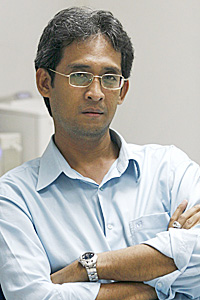
Prime Minister Prayut Chan-o-cha sent the nation's political circles into a frenzy of speculation this week after he broke his silence about his future on Monday by expressing interest in entering the political fray.
Even though it came as scant surprise to many, the premier's brief remark that he was "interested in political positions" drew criticism from politicians who have called for "fair play" from the regime ahead of a general election tentatively scheduled for late February.
Some have likened the former coup leader to a sports referee who has decided to become a player. Others demanded he resign from his post as head of the ruling National Council for Peace and Order (NCPO) if he wants to enter politics as democracy is restored to Thailand.

Soonruth Bunyamanee is editor, Bangkok Post.
I don't agree with this sports analogy, however. Gen Prayut and the NCPO are not umpires but more akin to a governing body like Fifa or the World Boxing Council. They can set the rules, disqualify players and even pick the referees.
Despite this, I don't consider it necessary for Gen Prayut to step down from the NCPO.
In some ways it's a relief the premier has finally admitted what we have long suspected: that he wants to stay in power. He deserves the right to officially enter politics, but he must play by the rules by revealing which path he will choose to become prime minister for a second term while also lifting the ban on political campaigning.
But Gen Prayut has declined to unveil any more details. That also comes as no surprise. As a military veteran, he is most likely acquainted with Sun Tzu's ancient military treatise, The Art of War. One of its key principles is: "When we are near, we must make the enemy believe we are far away. When far away, we must make him believe we are near."
Whether he is a good student of Sun Tzu's teachings is another matter, as few people were convinced he was not interested in politics while he kept mum on the matter.
On Monday, Gen Prayut hardly elaborated on his political future, saying he didn't want to expose himself to criticism so soon. That logic is fair enough. But I suspect the real reason is that he is waiting to see how many MPs he can win over -- via the various political parties that have committed to supporting him -- before he makes a more detailed announcement.
In fact, there are several good reasons why Gen Prayut should not fret but rather clarify his political plans.
Under the 2017 constitution, he has two channels to potentially reprise his role as premier early next year.
The first option would see his name appear on a party list of three prime ministerial candidates. But his party would need at least 251 votes from the nation's 500 MPs to be eligible to nominate Gen Prayut for a parliamentary vote to become prime minister.
The second option could see him nominated as a non-elected "outsider" prime minister. This arrangement could be triggered if parliament fails to choose a prime minister under the first option, provided at least two thirds of all senators and MPs throw their support behind him.
Regardless of which path he chooses to take, the 2017 charter would work to his advantage as it states that during a five-year "transitional period" after the poll, all 250 senators must be appointed by a mechanism that has yet to be installed by the NCPO.
The senators could prove decisive in the vote to select the premier as Gen Prayut would need at least 376 out of 750 votes (500 MPs and 250 senators) to win. This means that if he received the backing of every single senator, he would only need the approval of 126 MPs.
Palang Pracharat, a newly established party that has said it would back both the regime and Gen Prayut, is reportedly aiming to win 70-80 MP seats. While this strikes me as an overly ambitious goal, it could garner 50, meaning Gen Prayut would only have to find another 76 "sympathetic" MPs from other parties.
In contrast, larger and more established parties like Pheu Thai and the Democrats would face an uphill challenge in trying to win 375 votes without the help of the senators. In the eyes of most pundits, such a result is practically inconceivable.
Even if the two major parties were to join hands in an attempt to block Gen Prayut's nomination, they would be unlikely to succeed. That is because the new electoral system -- designed by the same team that drafted the new constitution, led by veteran legal eagle Meechai Ruchuphan -- will produce fewer party-list MPs representing the major parties and more representing smaller parties.
It's also unlikely the Democrats would ever form an alliance with Pheu Thai, even though we can't rule this out entirely. This may explain the recent challenge to incumbent Democrat leader Abhisit Vejjajiva, who does not support Gen Prayut rising to power through non-democratic means.
Warong Dechgitvigrom, the Democrat Party's former MP for Phitsanulok, is due to announce tomorrow that he will contest the party's leadership race. He is said to be backed by former members of the People's Democratic Reform Committee (PDRC), led by Suthep Thaugsuban. Mr Suthep is also in Gen Prayut's corner.
If the Democrat Party were to change its stance, Gen Prayut's road to regain the premiership would effectively be free of any serious hurdles.
In my view, the premier should make sure his name is on one of the party's lists of nominated candidates. That would be the most acceptable option. Perhaps he will choose the Palang Pracharat Party. It is due to be inaugurated this Saturday and several of Gen Prayut's cabinet members are expected to participate.
Above all, the prime minister must clarify his political future and ensure the rules of fair play are respected in the lead-up to the poll.
